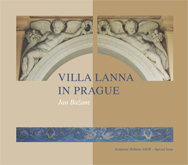 International conference organized by the Department for the Study of Late Socialism and Post-Socialism of the Institute of Contemporary History of the ASCR and the Department for the Study of Modern Czech Philosophy of the Philosophy Institute of the ASCR was held October 2–3, 2014 at Villa Lanna in Prague. 1989 was a year of democratic revolutions and the fall of “real socialism” in Central Europe. Did it signal the end of revolutionary regimes and the beginning of a “restoration,” or rather the replacement of worn-out communist revolutions with a new, neoliberal revolution? Or, considering the nonviolent character of the events, did they really constitute a revolution at all?
International conference organized by the Department for the Study of Late Socialism and Post-Socialism of the Institute of Contemporary History of the ASCR and the Department for the Study of Modern Czech Philosophy of the Philosophy Institute of the ASCR was held October 2–3, 2014 at Villa Lanna in Prague. 1989 was a year of democratic revolutions and the fall of “real socialism” in Central Europe. Did it signal the end of revolutionary regimes and the beginning of a “restoration,” or rather the replacement of worn-out communist revolutions with a new, neoliberal revolution? Or, considering the nonviolent character of the events, did they really constitute a revolution at all?
Foto: Stanislava Kyselová, Akademický bulletin
All modern political identities and ideological currents are marked by their attitudes toward
the phenomenon of revolution and toward various historical revolutionary models. The chief aim of
this conference was to historicize the democratic revolutions of 1989 in Czechoslovakia and
East-Central Europe, moving beyond the dominant “transitological” understanding of these
revolutions in terms of the “End of Communism” and the “Beginning of Democracy.” This
historicization will be achieved by scrutinizing historical accounts and contemporary reflections
of observers and actors involved in the revolutions. These reflections were not merely spontaneous
observations. They were a part of long-term intellectual and conceptual developments, firmly rooted
in specific cultural and political tendencies, expert cultures, and contexts, which not only helped
to structure a general understanding of the historical changes but also shaped ideas about the
future, which in turn helped to set the foundations for emerging political culture in the region.
In other words, we would like to ask how certain interpretations of the European and global
revolutionary experience influenced understandings (and self-understandings) of the revolutions of
1989.
The conference focused on the following themes: Democratic, Liberal, or Neoliberal
Revolution? Dissent, Post-Dissent, and the Ideas of 1989. The End of History or the End of the
Future? Theories of Soviet-type Society. The Second Life of the Prague Spring in 1989.
7 Oct 2014


 Česky
Česky













